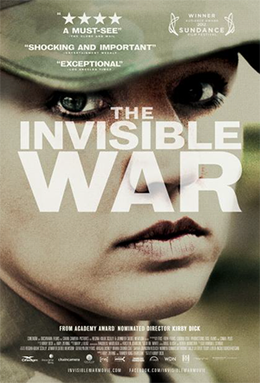THE INVISIBLE WAR
Rape is a crime where one is victimized twice: once at the actual attack, then afterwards when the raped has to endure assaults on their reputation. That in itself is already horrifying. The Invisible War, a documentary about rape within the U.S. military, is beyond horrifying. It is infuriating, tragic, and highly upsetting.
Director Kirby Dick chronicles several stories from women who are or have served in the various military branches. All of them started out in the military for various reasons: a sense of duty, family history of service, a chance to advance in their careers. Each then tells a horrifying story of being raped by their fellow servicemen, ranging from colleagues to their superiors.
The effects on their assaults take all forms. All of them bear scars. Some, like Kori Cioca, was so brutally assaulted that her jaw was severely damaged, with the Veterans Affairs Department refusing to cover the medical expenses of her injuries (which are extensive). Some, like Hannah Sewell, are emotional. It is heartbreaking to hear her recount how she called and told her father, Sergeant Major Jerry Sewell, that she was no longer a virgin.
All the victims of rape within the military, including one man, have been highly traumatized by what they endured. The Invisible War doesn't shy away from what their loved ones also endure by their own helplessness. It strikes a fierce reaction to see Sgt. Maj. Sewell, in his uniform looking like your "man's man", break down in tears recounting how he tried to comfort his daughter by telling her she was still a virgin.
What really infuriates about The Invisible War is that despite the obvious evidence of the problem of sexual violence within the ranks (from the Tailhook scandal to Arbeen Training Ground and the Air Force Academy sexual assault scandals from 1991, 1996, and 2003 respectively), the military doesn't appear to take this seriously. We see the responses to the problem the Pentagon offers: training that urges the troops to "ask her when she's sober" or to urge troops to go out with a buddy.
The problem as argued in The Invisible War is that the military is highly insular. The same people who commit the crimes are also the ones placed to investigate the crimes or have a close connection to the attacker. Moreover, there is still a sense within the military that somehow 'they asked for it'. Some of the interviewees talk about how they were suppose to investigate the victims to see if they were promiscuous or had somehow brought this about themselves. Why had she gone drinking with so-and-so, ignoring she was basically ordered to go with other Marines to bar-hop and pressured into the situations.
The Invisible War makes its case that the investigation of sexual assaults should be taken out of those in command and shifted to an independent group. To its credit, when the women go to Congress for a redress of grievances, The Invisible War makes clear this is a non-partisan issue. Both Democratic and Republican Congressmen are interviewed, expressing their frustration and determination to continue chipping at the intransigent military that either doesn't think there is a problem or is not handling things correctly.
We end with a call to join in the fight to get involved, complete with web address.
In this sense The Invisible War is an advocacy film (a film that calls for us to take action for/against their position). It's par for the course that many documentaries are advocacy films, and even while I can agree with them I tend to shy away from these types of films. However, the personal stories in The Invisible War are far too important to ignore. We see the emotional and physical damage these women (and one man, Michael Matthews) have to live with while the abusers continue to flourish.
Almost all of the attackers, who are not named of course, we're told, have continued in the military, some earning promotions and awards for their service. That puts the insult to the injury.
The Invisible War tells a compelling, heartbreaking, infuriating story, one that must be told and must be heard. I do quibble with the fact that we get only brief glimpses of male-on-male assaults. The focus is on women who are raped by men, but while we get Mr. Matthews story, we don't get much of it and only one or two glimpses of other men who've been victimized. One wonders if another film could be made of their stories, and I wonder why this was introduced when it had so little airtime.
Again, this is a minor complaint, especially given how upsetting and relate able the stories are. Ms. Cioca in particular is profiled. We not only get her own story, but we also follow her as she goes to medical visits (which are bungled) and see her fellow Coast Guard veteran/husband express his own frustration as well as the difficulties this is causing in their marriage.
The Invisible War should be seen by all those who care about military matters. Of course, it is highly unfair to say all veterans are rapists or have been raped. There are probably many veterans and active-duty servicemen/women who have been spared this horror. However, one rape is one too many, and it is vital that the military truly change to protect those who protect us.
DECISION: B+

No comments:
Post a Comment
Views are always welcome, but I would ask that no vulgarity be used. Any posts that contain foul language or are bigoted in any way will not be posted.
Thank you.